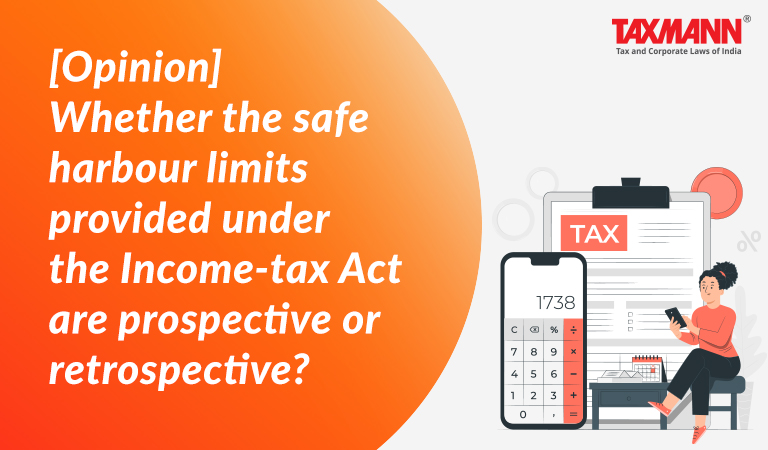[Opinion] Whether the safe harbour limits provided under the Income-tax Act are prospective or retrospective?
- Blog|News|Income Tax|
- 3 Min Read
- By Taxmann
- |
- Last Updated on 6 December, 2022

Mukesh Kohli – [2022] 145 taxmann.com 263 (Article)
There is dispute whether inserting proviso thereto and by enhancing tolerance band for variation between stated sale consideration/purchase consideration vis-à-vis stamp duty valuation are retrospective or prospective.
In past, there was a controversy as to whether section 43CA or section 50C (which is similar to section 43CA) can be applied, if the difference between the stamp duty value and the declared consideration did not exceed a particular percentage.
The Hon’ble Kolkata Tribunal in case of Heilgers Development & Construction Co. (P.) Ltd. v. Dy. CIT [2013] 32 taxmann.com 147 had taken a view that in absence of specific provision under section 50C, stamp duty value to be taken as full value of consideration, even if difference in stamp duty value and sale consideration is marginal. However, in following judgments, Tribunal has taken a view that if such difference is marginal or less than 10%, the declared consideration cannot be substituted with stamp duty value :
(a) ITO v. Bajaj Udyog [2019] 111 taxmann.com 151/[2020] 180 ITD 77 (Jp. – Trib.)
(b) Surendra S Gupta v. Addl. CIT [2018] 93 taxmann.com 456/170 ITD 732 (Mum. – Trib.)
(c) Smt. Sita Bai Khetan v. ITO [2017] 88 taxmann.com 377/[2016] 50 ITR (T) 196/181 TTJ 549 (Jp. – Trib.)
(d) Suresh C. Mehta v. ITO [2013] 35 taxmann.com 230/144 ITD 427/158 TTJ 821 (Mum. -Trib.)
(e) John Flower (India) (P.) Ltd. v. Dy. CIT [IT Appeal No. 7545 (Mum) of 2014, dated 25-1-2017].
Prima facie, the legislature recognised the need for safe harbour.
Now first of all we will try to see the relevant sections like 43CA, 50C,56(2) and amendments made by various Finance Act.
Section 43CA
Section 43CA, prior to its amendment by Finance Act, 2018 provided, inter alia, that if a person carrying on a business transfers land or building or both for a consideration where the stamp duty value of the property exceeds the declared consideration, then, the stamp duty value of the property shall be deemed to be the consideration for the purpose of computation of his business income.
Proviso has been inserted to section 43CA (1) with effect from assessment year 2019-20 to provide that if the stamp duty value does not exceed 105% of the declared sale consideration, the declared consideration shall be reckoned for the purposes of computing profits and gains. In other words, the stamp duty value will be adopted as consideration only if it exceeds 105% of the declared consideration.
Amendment in Section 43CA
Finance Act, 2020 amends the proviso under sub-section (1) to increase the safe harbour of 5% to 10% with effect from 1-4-2021, i.e., assessment year 2021-22; the stamp duty value will be adopted as consideration only if it exceeds 110% of the declared consideration.
The Finance Act, 2021 makes following amendments:
(i) It inserts second proviso to section 43CA(1) to increase safe harbour threshold from existing 10% to 20%, in respect of transfer of a residential unit, if the following conditions are satisfied:
(a) The transfer of residential unit takes place during the period from 12th November, 2020 to 30th June, 2021;
(b) The transfer is by way of first-time allotment of the residential unit to any person; and
(c) The consideration received or accruing as a result of such transfer does not exceed Rs. 2 cr.
(ii) It inserts Explanation below sub-section (4) to define “residential unit” and it reads as under:
“For the purposes of this section, “residential unit” means an independent housing unit with separate facilities for living, cooking and sanitary requirement, distinctly separated from other residential units within the building, which is directly accessible from an outer door or through an interior door in a shared hallway and not by walking through the living space of another household.”
The amendment takes effect from 1st April, 2021 and accordingly, it applies to assessment year 2021-22 and subsequent assessment years.
Click Here To Read The Full Article
Disclaimer: The content/information published on the website is only for general information of the user and shall not be construed as legal advice. While the Taxmann has exercised reasonable efforts to ensure the veracity of information/content published, Taxmann shall be under no liability in any manner whatsoever for incorrect information, if any.

Taxmann Publications has a dedicated in-house Research & Editorial Team. This team consists of a team of Chartered Accountants, Company Secretaries, and Lawyers. This team works under the guidance and supervision of editor-in-chief Mr Rakesh Bhargava.
The Research and Editorial Team is responsible for developing reliable and accurate content for the readers. The team follows the six-sigma approach to achieve the benchmark of zero error in its publications and research platforms. The team ensures that the following publication guidelines are thoroughly followed while developing the content:
- The statutory material is obtained only from the authorized and reliable sources
- All the latest developments in the judicial and legislative fields are covered
- Prepare the analytical write-ups on current, controversial, and important issues to help the readers to understand the concept and its implications
- Every content published by Taxmann is complete, accurate and lucid
- All evidence-based statements are supported with proper reference to Section, Circular No., Notification No. or citations
- The golden rules of grammar, style and consistency are thoroughly followed
- Font and size that’s easy to read and remain consistent across all imprint and digital publications are applied



 CA | CS | CMA
CA | CS | CMA
